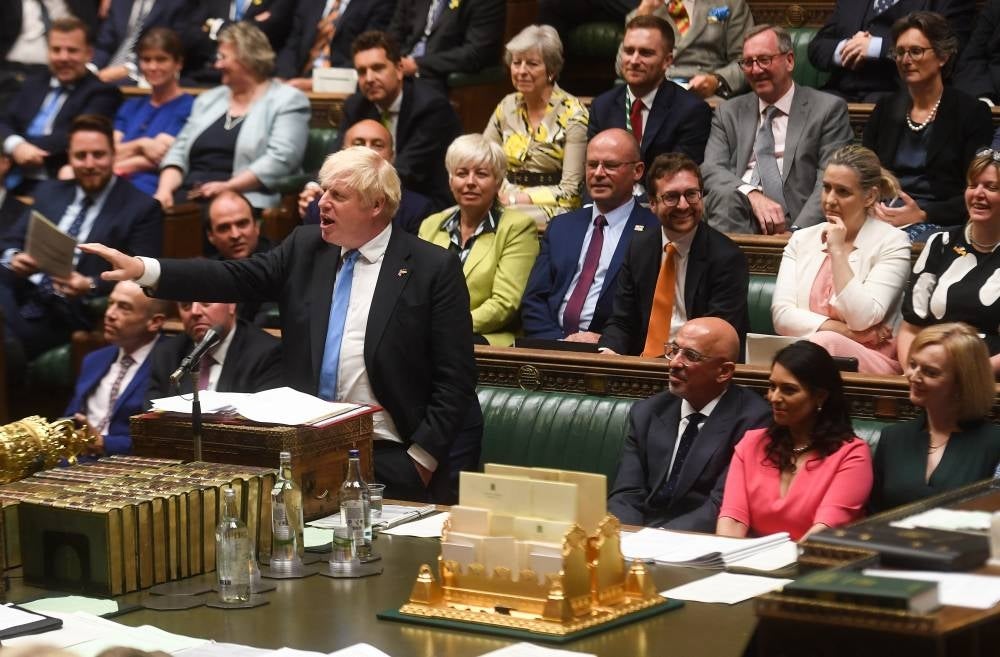Does the Westminster system breed constant backstabbing and betrayal?

In his last speech in Parliament, Boris Johnson quoted the Terminator: “Hasta la vista baby”.
The speech seemed a little self-aggrandising. It looked a bit like no one was willing to sing his praises on his way out, so the poor man had to do it by himself. A better, more statesman-like approach would have been to sing the praises of those he worked with.
More to the point of this article, it was interesting to see Chancellor of the Exchequer Nadhim Zahawi sitting right behind Johnson during the speech.
Zahawi had been a Johnson supporter, and may be most famously remembered for backstabbing Johnson by calling on him to step down as Prime Minister some 36 hours after Johnson promoted Zahawi from Education Secretary (Education Minister) to Chancellor of the Exchequer (Finance Minister) - which is the third highest ranking cabinet position, after the Deputy Prime Minister and the PM himself.
Even in the treacherous world of politics where we’ve come to expect such things, 36 hours is really quite something.
The whole episode made me reflect on some salient features of modern politics, especially within the Westminster system.
I have worked both in civil society, and (very briefly) in politics.
Civil society organisations (CSOs) are far from perfect, and they have a whole world of internal politics of their own.
I have nonetheless often summarised one key difference between the best CSOs and political parties as: in good CSOs, allies are (generally speaking) straightforward allies; in politics, allies are only allies within a certain context, and for certain periods of time.
Just as an example, let’s say everyone within PKR are theoretically allies when it comes to fighting Umno; these same allies however suddenly become bitter sworn enemies when it comes to internal PKR elections (the same applies to essentially any other political party).
It’s a strange feeling then, when you’re supposed to be working closely with these allies, ostensibly towards ‘shared’ goals, all the while knowing that people are all liable to suddenly turn against one another at some indeterminate time in the future - maybe even just 36 hours into the future.
It’s alright to cooperate with people some of the time, and compete with them at other times. But in politics, this is really blown up to dizzying degrees.
This ultimately creates a very toxic ecosystem where any kind of genuine progress or focus on the people’s welfare becomes extremely difficult, because everyone is too busy plotting against each other.
On this theme, it is particularly interesting to look at the position of Deputy Prime Minister here in Malaysia, a position that until very recently has always also been the position of Deputy President of Umno.
Just for the context of this article, we can think of these two positions as somewhat interchangeable.
I have always thought of the position of a ‘deputy’ should ideally mean your number one guy - the person you most rely on.
I’m a Trekkie, so the captain’s first officer comes to mind - the person the leader relies on the most (of course, for a different take, there’s always the movie Crimson Tide).
In our politics however, the position of ‘deputy’ seems to mean: the person most likely to get too ambitious and mount and attack against the leader.
This is no surprise given that eliminating the incumbent number one often results in number two being promoted to number one.
I like both Star Wars and Star Trek, but the Star Wars logic when it comes to the Sith Lord’s Rule of Two seems a bit suspect.
This rule stated that there can only be two Sith at any given time, a master and an apprentice. It was expected that the apprentice might one day kill the master, or that the master might secretly train a new apprentice to kill his old one (like in the case of Anakin and Count Dooku).
Much like the Joker’s criminal organisation in The Dark Knight, this system of leadership does not seem sustainable - even for fictitious evil organisations.
Coming back to reality, we can look at the list of DPMs in Malaysia.
Abdul Razak Hussein (somewhat subtly) ousted Tunku Abdul Rahman; Musa Hitam rebelled against Mahathir Mohamad; Mahathir let Ghafar Baba be ousted by Anwar Ibrahim, who himself famously rebelled against Mahathir.
Abdullah Badawi and Najib Razak played the role of patient, loyal DPMs, but Muhyiddin Yassin would eventually return to the tradition of rebellion. He traded Najib as PM for Mahathir, but eventually betrayed Mahathir as well. Muhyiddin himself was later ousted, and replaced by his deputy, current PM, Ismail Sabri.
In PKR, we recently saw the party congress, where newly minted deputy president Rafizi Ramli and team spent time taking pot shots at party president Anwar - whose previous deputy president was none other than Azmin Ali. The pattern repeats again and again.
On the UK side, two similar episodes were portrayed in the drama, The Crown. The first being the relationship between Anthony Eden and Winston Churchill, where again Eden, one time loyalist and right hand man of Churchill, eventually began pushing hard for Churchill to leave. Eden himself would be betrayed and pushed out by Harold Macmillan.
In later seasons, we saw Margaret Thatcher also being forced out by once loyal Conservative MPs. Johnson’s fate has been likened to her experience.
So many knives, plunged into so many backs.
These paragraphs above can hardly summarise the sheer amount of energy and resources that were poured into fighting these political battles. In Malaysia, it would not surprise me that tens or hundreds of millions of ringgit have exchanged hands in these battles.
Imagine if we put all that time, energy and money into something that actually helped the nation, instead of making a mockery of democracy.
It is of course good that leaders can be voted out if they are failing to perform; but both in Malaysia and the UK, this system through which we choose leaders seems to result in severe dysfunction and meaningless competition.
In fact, it is feudal loyalty that determines ideology, rather than the other way around.
When Muhyiddin wanted to challenge Najib, he declared “I am Malay first, Malaysian second”, probably primarily because this provided a clear contrast between Najib’s 1Malaysia ideology.
This all seemed a little odd when Muhyiddin later became part of a coalition government together with DAP.
Political systems and structures are famously inert. There are times when I think they are completely defined by inertia, more than anything else.
The people who rise to the top of this system have mastered how to game it, and once they reach the top using that particular skillset, they have little to no incentive to change the system - if they did, the skills and capital they have built in getting to the top would be rendered useless.
Thus, even while we can barely run today’s apps on a smartphone from five or ten years ago, our political systems are hundreds of years old, and are clearly not fit for purpose.
If we can redesign them however, and build systems and structures that incentivise cooperation instead of competition, we may have a chance of stopping all this wasteful, pointless bickering.
NATHANIEL TAN works with Projek #BangsaMalaysia. Twitter: @NatAsasi, Email: [email protected]. #BangsaMalaysia #NextGenDemocracy.
The views expressed in this article are the author's own and do not necessarily reflect those of Sinar Daily.















